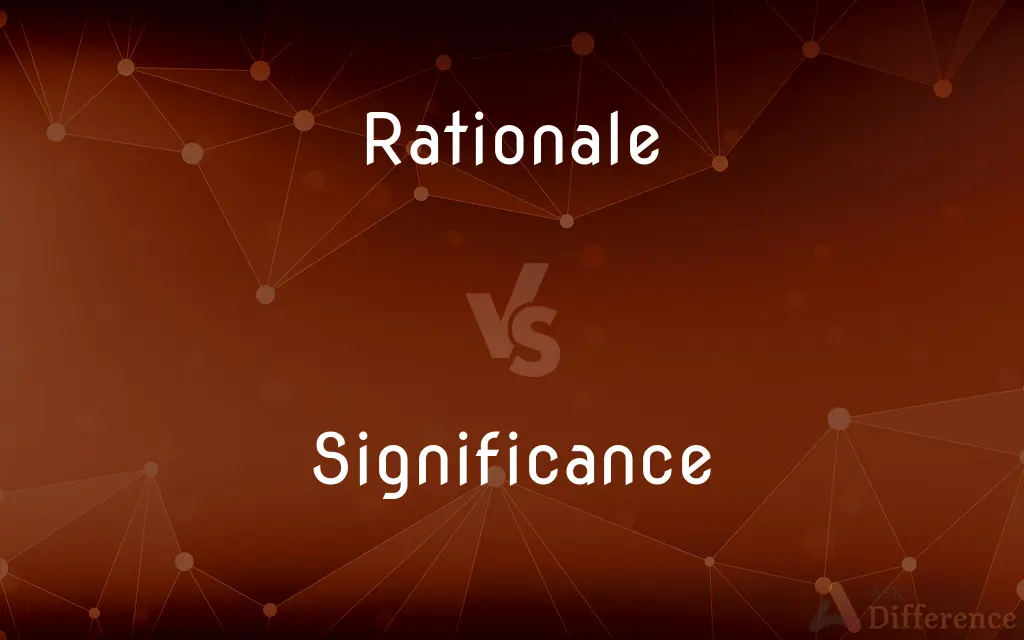Rationale vs. Significance — What's the Difference?
By Fiza Rafique & Maham Liaqat — Updated on May 6, 2024
Rationale refers to the reasoning or logical basis behind a decision or theory, focusing on why actions are taken, while significance denotes the importance, impact, or value of something, highlighting its relevance or consequences.

Difference Between Rationale and Significance
Table of Contents
ADVERTISEMENT
Key Differences
Rationale involves explaining the underlying reasons or logic for decisions, actions, or beliefs, often providing a step-by-step justification. On the other hand, significance refers to the importance or influence of an event, decision, or phenomenon, indicating its impact on broader contexts or systems.
While rationale is focused on the thought process and justifications, significance deals with outcomes and effects.
Rationale is critical in academic, scientific, and philosophical discussions where explaining 'why' something is done is essential. Conversely, significance is often discussed in contexts like historical analysis, where the impact or importance of events leads to a deeper understanding of their effects.
The rationale can often be subjective, based on personal or cultural perspectives, whereas significance is usually assessed in terms of objective outcomes and measurable impacts.
While the rationale is necessary for forming arguments and theories, significance is crucial for assessing the relevance and prioritizing issues or ideas based on their effects.
ADVERTISEMENT
Comparison Chart
Focus
Logic and reasoning behind decisions
Importance and impact of outcomes
Contexts
Academic, scientific, decision-making
Historical, practical, relevance assessment
Nature
Subjective, based on reasoning
Objective, based on measurable impacts
Key Concern
Why something is done
What impact or value something has
Application
Justifying actions, forming arguments
Assessing effects, prioritizing issues based on impact
Compare with Definitions
Rationale
The reasoning behind a decision or action.
The rationale for the new policy was to improve safety.
Significance
Impact or effect of an action or event.
They discussed the economic significance of the new legislation.
Rationale
Justification given for a course of action.
He provided a detailed rationale for choosing this particular method.
Significance
Noteworthiness or consequence of findings.
His research gained significance in the scientific community.
Rationale
Basis or underlying reasons for a belief.
Her rationale was rooted in extensive research.
Significance
The importance or influence of something.
The significance of the discovery changed the field of physics.
Rationale
Logical basis for a theoretical approach.
The scientist explained the rationale behind the experiment.
Significance
The meaning or value attributed to a particular event.
The treaty’s significance was in its role in ending the war.
Rationale
Explanation of why something is done a certain way.
The engineer’s rationale for the design focused on energy efficiency.
Significance
The degree to which something matters or affects situations.
The significance of timely decision-making is crucial in emergencies.
Rationale
The fundamental reasons for something; the basis
The rationale for dropping the atomic bomb.
Significance
The quality of being worthy of attention; importance
Adolescent education was felt to be a social issue of some significance
Rationale
An explanation of the basis or fundamental reasons for something.en
Significance
The meaning to be found in words or events
The significance of what was happening was clearer to me than to her
Rationale
A justification or rationalization for something.
Significance
The extent to which a result deviates from that expected to arise simply from random variation or errors in sampling.
Rationale
A liturgical vestment worn by some Christian bishops of various denominations.
Significance
The state or quality of being significant
A matter of some significance.
Rationale
An explanation or exposition of the principles of some opinion, action, hypothesis, phenomenon, or the like; also, the principles themselves.
Significance
A meaning that is expressed or implied
What was the significance of that smile?.
Rationale
(law) an explanation of the fundamental reasons (especially an explanation of the working of some device in terms of laws of nature);
The rationale for capital punishment
The principles of internal-combustion engines
Significance
The extent to which something matters; importance
As a juror your opinion is of great significance for the outcome of the trial.
Significance
Meaning.
The significance of a gesture
Significance
The quality or state of being significant.
Significance
That which is signified; meaning; import; as, the significance of a nod, of a motion of the hand, or of a word or expression.
Significance
Importance; moment; weight; consequence.
With this brain I must work, in order to give significancy and value to the few facts which I possess.
Significance
The quality of being significant;
Do not underestimate the significance of nuclear power
Significance
A meaning that is not expressly stated but can be inferred;
The significance of his remark became clear only later
The expectation was spread both by word and by implication
Significance
The message that is intended or expressed or signified;
What is the meaning of this sentence
The significance of a red traffic light
The signification of Chinese characters
The import of his announcement was ambigtuous
Common Curiosities
Can the rationale and significance overlap?
Yes, the rationale and significance can overlap when the reasoning behind an action directly relates to its impact or importance.
How do you determine the significance of historical events?
The significance of historical events is determined by assessing their impact on subsequent events, their role in societal changes, and their lasting effects on cultures or regions.
What makes an event significant in the context of global history?
An event becomes significant in global history if it has a profound and wide-reaching impact, influencing multiple cultures, economies, or political landscapes.
Is rationale always based on logical reasoning?
While rationale should ideally be based on logical reasoning, it can sometimes reflect personal biases, assumptions, or incomplete information.
How is significance assessed in scientific studies?
In scientific studies, significance is often assessed through statistical analysis to determine the reliability of results and their implications in the broader context of the field.
What is a rationale in research?
In research, a rationale explains the reasoning behind the study's objectives and the choice of methodology, outlining why the research is necessary and what it seeks to address.
Why is understanding the rationale important in decision-making?
Understanding the rationale is important as it provides clarity on the decisions' objectives and helps evaluate whether the chosen methods are appropriate for achieving the desired outcomes.
How can significance influence public policy?
Significance influences public policy by highlighting crucial issues that require government attention and resources, guiding policy priorities and implementations.
What are examples of rationale in everyday decision-making?
Examples include choosing a job based on career goals, selecting a home based on family needs, or making financial decisions to secure long-term stability.
What role does rationale play in academic writing?
In academic writing, the rationale establishes the foundation for the research approach, justifying the relevance and necessity of the study.
Share Your Discovery

Previous Comparison
Assimilation vs. Socialization
Next Comparison
Fender vs. MudguardAuthor Spotlight
Written by
Fiza RafiqueFiza Rafique is a skilled content writer at AskDifference.com, where she meticulously refines and enhances written pieces. Drawing from her vast editorial expertise, Fiza ensures clarity, accuracy, and precision in every article. Passionate about language, she continually seeks to elevate the quality of content for readers worldwide.
Co-written by
Maham Liaqat












































